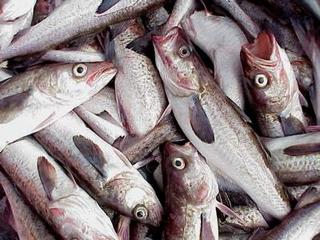Pollock fishing deemed sustainable by MSC; potentially harmful by Seafood Watch

Wednesday, January 20 2010
Unalaska, AK – As the Marine Stewardship Council is moving toward the re-certification of the pollock fishery as sustainable, Seafood Watch has downgraded its categorization of the fish from "Best Choice" to "Good Alternative."
The Marine Stewardship Council is the highest regarded independent certifier for sustainable fisheries. It was recently ranked the best seafood sustainability certifier by a World Wildlife Fund assessment. Pollock was first certified by MSC five years ago. Last week, independent evaluators said it qualifies for re-certification. Pat Shanahan, the program director for Genuine Alaska Pollock Producers, said the certification is additional evidence of the health of the fishery and having it improves sales.
"The MSC certification is important to the pollock industry mostly because it's important to some of our major customers. Particularly in Europe retailers are under great pressure from the environmental NGOs to have a sustainability policy that has an independent verification of sustainability," she said. "We all know in Alaska that the fisheries are very well managed and sustainable, but these retailers require an independent certification of that."
To get MSC certification, pollock industry members paid an independent group of fisheries experts, Moody Marine, to evaluate the fishery according to the MSC's standards. The fishery was shown to be managed to protect the longevity and sustainability of the fish stocks as well as to minimize environmental harm.
But scientists and assessors from Seafood Watch, a program from the Monterey Bay Aquarium that helps consumers choose sustainable seafoods, disagrees slightly. Seafood Watch recently moved pollock from their top-level "Best Choice" category down to "Good Alternative." Communications director Ken Peterson said pollock stock management is very good, and they still recommend pollock as a good choice for consumers. However, new information about the effects of pelagic trawl gear on the rest of the ecosystem caused the reclassification.
"We have information from NOAA published science that demonstrates that the pollock trawls are often fished on the ocean bottoms, which raised concerns for us about the impact that the trawling is having on sea floor habitats that are needed for other marine life," he explained. "And that was the primary consideration for moving it from our Best Choice' to our Good Alternative' category."
Peterson said they are also concerned about the salmon bycatch within the fishery as well as the fishery's potential effects on Steller Sea Lions.
"Our goal in the long run is healthy ocean habitats both for species that are targeted commercially, like Alaska pollock, and for a variety of other marine life, and in the long range, ecosystems that can support a healthy and robust fishery that puts people to work and puts food on our plates."
Peterson said that the Seafood Watch program uses more vigorous precautionary conservation filters than MSC. Though they downgraded pollock, the program still supports purchasing the fish. Shanahan disagrees with the change.
"We're quite disappointed in the downgrading of pollock by the Monterey Bay Aquarium and feel that they've misjudged the fishery."
The MSC is now accepting public comments on the re-certification of pollock as a sustainable fishery.



